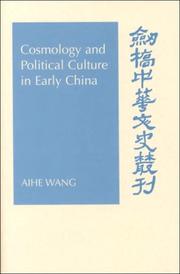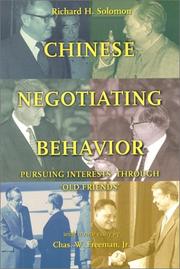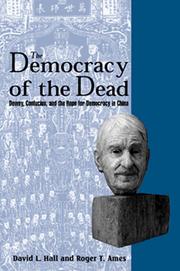| Listing 1 - 6 of 6 |
Sort by
|

ISBN: 0521624207 0521027497 0511529228 9780521624206 9780511529221 9780521027496 Year: 2000 Volume: *1 Publisher: Cambridge Cambridge University Press
Abstract | Keywords | Export | Availability | Bookmark
 Loading...
Loading...Choose an application
- Reference Manager
- EndNote
- RefWorks (Direct export to RefWorks)
This radical reinterpretation of the formative stages of Chinese culture and history traces the central role played by cosmology in the formation of China's early empires. It crosses the disciplines of history, social anthropology, archaeology and philosophy to illustrate how cosmological systems, particularly the Five Elements, shaped political culture. By focusing on dynamic change in early cosmology, the book undermines the notion that Chinese cosmology was homogeneous and unchanging. By arguing that cosmology was intrinsic to power relations, it also challenges prevailing theories of political and intellectual history.
Cosmologie chinoise --- Cosmology [Chinese ] --- Kosmologie [Chinese ] --- Cosmology, Chinese --- Political culture --- China --- Politics and government --- Cosmology, Chinese. --- To 221 B.C. --- 221 B.C.-220 A.D. --- China - Politics and government - 221 B.C. to 220 A.D. --- Arts and Humanities --- History --- Chinese cosmology --- Political culture - China --- China - Politics and government - To 221 B.C. --- China - Politics and government - 221 B.C.-220 A.D.
Book
ISBN: 9781793616678 1793616671 9781793616685 Year: 2021 Publisher: Lanham, Md Lexington Books
Abstract | Keywords | Export | Availability | Bookmark
 Loading...
Loading...Choose an application
- Reference Manager
- EndNote
- RefWorks (Direct export to RefWorks)
Dictatorship by Degrees: Xi Jinping in China traces the totalitarian elements that linger in China’s governing policies and practices, such as extra-legal Anti-Corruption Campaign, great concentration of power in one man, increasing intolerance, increasing propaganda, increasing indoctrination, increasing self-criticism inside the Party, expansion of Party cells across society, increasing censorship, cult of personality, and mass incarceration in Xinjiang. Steven P. Feldman develops a concept of pre-totalitarianism to explore these developments through extensive field data, including interviews with business executives, professors, lawyers, and non-profit executives, and observations of daily life. Feldman argues that Chinese political culture, based on the core principle of small group loyalties is inherently unstable, resulting in an ongoing tendency for leaders to concentrate power to survive and accomplish their goals. Under communist dictatorial political organization, totalitarian domination is always a temptation and risk.
CHINA--POLITICS AND GOVERNMENT --- POLITICAL CULTURE--CHINA --- TOTALITARIANISM --- XI, JINPING --- Political culture --- Political culture. --- Politics and government. --- Totalitarianism. --- Totalitarisme. --- totalitarianism. --- Xi, Jinping. --- Zhongguo gong chan dang --- Zhongguo gong chan dang. --- History. --- Since 1900. --- China --- China. --- Chine --- Politics and government --- Politique et gouvernement --- Political systems --- Internal politics --- Xi, Jinping
Book
ISBN: 9782724615005 272461500X Year: 2014 Publisher: Paris: Presses de sciences po,
Abstract | Keywords | Export | Availability | Bookmark
 Loading...
Loading...Choose an application
- Reference Manager
- EndNote
- RefWorks (Direct export to RefWorks)
Political culture --- Bureaucracy --- Culture politique --- Bureaucratie --- Zhongguo gong chan dang. --- China --- Chine --- Politics and government. --- Politique et gouvernement --- Zhongguo gong chan dang --- Politics and government --- Institutions politiques --- Parti communiste chinois --- S06/0223 --- S06/0424 --- S06/0425 --- China: Politics and government--People's Republic: general: since 1976 --- China: Politics and government--CCP: since 1989 --- China: Politics and government--Organization and structure of the CCP --- Political culture - China --- Bureaucracy - China --- China - Politics and government

ISBN: 1878379860 Year: 1999 Publisher: Washington, D. C. United States Institute of peace Press
Abstract | Keywords | Export | Availability | Bookmark
 Loading...
Loading...Choose an application
- Reference Manager
- EndNote
- RefWorks (Direct export to RefWorks)
Een carrièrediplomaat en een officier uit de Foreign Service geven een historisch overzicht van de Amerikaanse ervaringen in de relaties met China zoals die sinds de ping-pongdiplomatie aan het begin van de jaren zeventig gestalte kregen. De studie, uitgevoerd voor de invloedrijke conservatieve RAND Corporation mocht eerst niet openbaar gemaakt worden omdat er uitvoerig gebruik gemaakt werd van officiële onderhandelingsverslagen, maar werd uiteindelijk toch vrijgegeven. Erg opzienbarend zijn de gegevens echter niet maar ze tonen wel goed aan hoe de VS-diplomaten en onderhandelaars de Chinese onderhandelingsvaardigen flink onderschat hadden. De passages waarin de frustratie daarover beschreven wordt, zijn wel leuk om lezen maar het geheel heeft eerder iets van een handleiding in verkoopstechnieken dan van een historisch werk.
820 Internationale betrekkingen --- 883.2 Oost-Azië --- #SBIB:012.AANKOOP --- #SBIB:327.6H00 --- #SBIB:328H52 --- Internationale en diplomatieke relaties: algemeen --- Instellingen en beleid: China --- Négociation --- Negotiation --- Political culture --- Political psychology --- Mass political behavior --- Political behavior --- Political science --- Politics, Practical --- Psychology, Political --- Psychology --- Social psychology --- Bargaining --- Dickering --- Haggling --- Higgling --- Negotiating --- Negotiations --- Discussion --- Psychology, Applied --- Psychological aspects --- China --- United States --- Foreign relations --- 1949 --- -China --- 1945-1989 --- 1989 --- -Negotiation --- Political culture - China. --- Political psychology - China. --- 814 Theorie van de Internationale Betrekkingen --- 815 Geschiedenis --- 820 Internationale Betrekkingen --- 823 Diplomatie --- 836 (Multi-)nationale ondernemingen --- 844 Sociale Structuur --- 852 Internationale conflicten --- 856.3 Conflictbemiddeling/Onderhandelingstechnieken --- 882.4 Noord-Amerika

ISBN: 0812693949 9780812693942 Year: 1999 Publisher: Chicago: Open Court,
Abstract | Keywords | Export | Availability | Bookmark
 Loading...
Loading...Choose an application
- Reference Manager
- EndNote
- RefWorks (Direct export to RefWorks)
Democracy --- Political culture --- Confucianism --- S06/0250 --- S12/0216 --- S12/0400 --- S12/0820 --- S08/0520 --- -Democracy --- -Political culture --- -Culture --- Political science --- Self-government --- Equality --- Representative government and representation --- Republics --- Religions --- China: Politics and government--Political theory: general and traditional --- China: Philosophy and Classics--Political philosophy --- China: Philosophy and Classics--Kongzi 孔子 Confucius and Confucianism --- China: Philosophy and Classics--Comparative philosophy --- China: Law and legislation--Civil law, human rights: since 1949 --- Dewey, John --- -Contributions in democracy --- -China: Politics and government--Political theory: general and traditional --- Dewey, John, --- -Self-government --- Tu-wei, --- Tu-wei, Yüeh-han, --- Dyui, --- Dʹi︠u︡i, Dzhon, --- Dyuʼi, G'on, --- Дьюи, Джон, --- ديوى، جون، --- 杜威, --- Political and social views. --- Dīvīy, Jān, --- ديويي، جان --- Dīwʼī, Jān, --- Dīwiʼī, Jān, --- ديوئى، جان --- Diyūʼī, Jān, --- Dyūwi, Jon, --- Dyūi, Jon, --- デューウィジョン, --- デューイジョン, --- ジョン・デューウィ, --- ジョン・デューイ, --- Democracy - China --- Political culture - China --- Confucianism - China --- Dewey, John, - 1859-1952
Book
ISBN: 9780691134956 0691134952 9786613589330 1400842271 1280494107 9781400842278 9781280494109 Year: 2012 Publisher: Princeton, N.J. Princeton University Press
Abstract | Keywords | Export | Availability | Bookmark
 Loading...
Loading...Choose an application
- Reference Manager
- EndNote
- RefWorks (Direct export to RefWorks)
Established in 221 BCE, the Chinese empire lasted for 2,132 years before being replaced by the Republic of China in 1912. During its two millennia, the empire endured internal wars, foreign incursions, alien occupations, and devastating rebellions--yet fundamental institutional, sociopolitical, and cultural features of the empire remained intact. The Everlasting Empire traces the roots of the Chinese empire's exceptional longevity and unparalleled political durability, and shows how lessons from the imperial past are relevant for China today. Yuri Pines demonstrates that the empire survived and adjusted to a variety of domestic and external challenges through a peculiar combination of rigid ideological premises and their flexible implementation. The empire's major political actors and neighbors shared its fundamental ideological principles, such as unity under a single monarch--hence, even the empire's strongest domestic and foreign foes adopted the system of imperial rule. Yet details of this rule were constantly negotiated and adjusted. Pines shows how deep tensions between political actors including the emperor, the literati, local elites, and rebellious commoners actually enabled the empire's basic institutional framework to remain critically vital and adaptable to ever-changing sociopolitical circumstances. As contemporary China moves toward a new period of prosperity and power in the twenty-first century, Pines argues that the legacy of the empire may become an increasingly important force in shaping the nation's future trajectory.
Political culture --- Political science --- Imperialism --- Ideology --- History --- Philosophy --- China --- Politics and government --- History. --- Politics and government. --- S06/0200 --- China: Politics and government--Government and political institutions: general and before 1911 --- Colonialism --- Empires --- Expansion (United States politics) --- Neocolonialism --- Administration --- Civil government --- Commonwealth, The --- Government --- Political theory --- Political thought --- Politics --- Science, Political --- Knowledge, Theory of --- Psychology --- Thought and thinking --- Anti-imperialist movements --- Caesarism --- Chauvinism and jingoism --- Militarism --- Social sciences --- State, The --- Philosophy&delete& --- All-under-Heaven. --- Chinese emperor. --- Chinese emperorship. --- Chinese empire. --- Chinese history. --- Chinese imperial experience. --- Chinese intellectuals. --- Chinese political culture. --- Chinese political system. --- Republic of China. --- administrative power. --- balances. --- bureaucracy. --- checks. --- commoners. --- contemporary China. --- cultural foundations. --- depersonalization. --- educated elite. --- flawed morality. --- fragmentation. --- government apparatus. --- historical changes. --- imperial history. --- imperial ideology. --- imperial political culture. --- imperial political structure. --- imperial unification. --- institution. --- intellectual elitism. --- large-scale uprisings. --- local elites. --- modern China. --- modernity. --- monarch. --- monarchism. --- monarchy. --- omnipotent. --- political actors. --- political durability. --- political dynamics. --- political unity. --- popular uprisings. --- power. --- prosperity. --- rebellion. --- scholar-officials. --- shi. --- social power. --- stateХlite interactions. --- tianxia. --- unified empire. --- unity. --- voluntary attachment. --- Political culture - China - History --- Political science - China - Philosophy - History --- Imperialism - China - History --- Ideology - China - History --- China - Politics and government
| Listing 1 - 6 of 6 |
Sort by
|

 Search
Search Feedback
Feedback About UniCat
About UniCat  Help
Help News
News